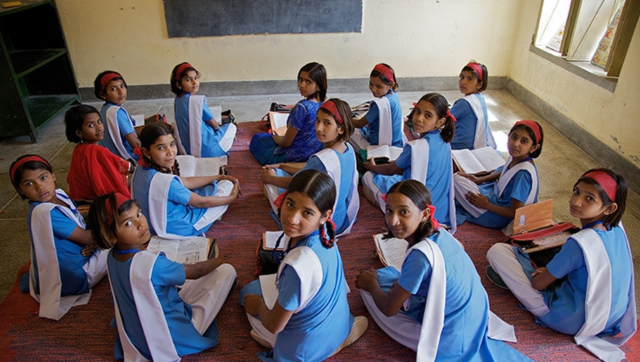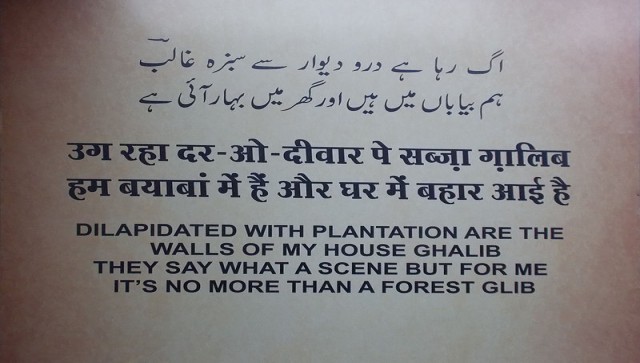The Godrej India Culture Lab in Mumbai turned into an ‘adda’ of the feminist kind on Tuesday, 18 April 2017.
A panel discussion titled ‘What’s Sex Got to Do With It’ aimed to talk about feminism and sexuality, with journalist and documentary filmmaker Paromita Vohra who runs the website Agents of Ishq, US-Egyptian journalist Mona Eltahawy, disability rights activist Bishakha Datta and academic Geeta Patel among the panelists.
The panelists discussed a whole lot of topics, ranging from sex, feminism and how are our lives are influenced by it.
We got a chance to catch up with Geeta Patel, who is an associate professor of Middle Eastern, South Asian Languages and Cultures and Women, Gender and Sexuality. She has worked on how nationalism, gender, sexuality and grief in 20th-century Urdu poetic movements intertwine in her book Lyrical Movements, Historical Hauntings: Gender, Colonialism and Desire in Miraji’s Urdu Poetry (Stanford University Press, 2002).
Excerpts from our interview:
Risky Business
Geeta spoke with us about her new book, Risky Bodies & Techno-Intimacy:
She then adds, “Actually a chapter on aravani kinara (the transgender community) is set in Mumbai, where I grew up and the other is on the film Fire when it was banned. People came to the streets to protest the ban. The film was stopped from being shown… People in Mumbai asked for the film to be shown and generally asked for a different kind of life where they would not be stopped from doing what they like. "
Languages Of Love
Since Patel specialises in poetry across Sanskrit, Urdu and Hindi, we asked if the portrayal of women and sexuality differs when it comes to different languages. She said, “Well, not really. South Asia is full of sexual poetry. Look at the Tamra Sangam. Bengali prose has a whole different set of sexual poetry. If you look at each language, the lexicon for sexuality might be different for every language, because different languages have different characters.”
She adds, “But I must say, Urdu is a stunning language to listen to. Since Urdu is familiar to everyone, maybe through Bollywood films, Urdu gets assigned the most pleasurable poetry of desire. We all get our little lexicon of love from Urdu. I mean, haven’t you?”
Feminism Through The Ages
We asked Patel about the history of feminism in India, and the religious traditions that are not very woman-friendly, like being forcefully isolated when you are on your period. She tells us, “Tradition is constituted at the moment when it becomes useful as a political device. So practices actually change a lot of times. I have to say one thing as a woman and as someone who has spent a lot of time in the village — if you do not have access to the temple and there were things that you couldn’t do, it wasn’t so bad. Because one of the things it let you out of is domestic work. But what I have an issue with is that gendered bodies are curtailed and power is organised through gendered bodies. People actually use gender as a way of establishing power.”
Has the way women are treated in India changed for the better? Is it safer to talk about sexuality as a woman, in spaces like this panel? Patel is not so sure about that. “Women wrote sexual poetry through the ages. We have an idea that now we have more freedom to say things because it makes us feel better than everybody else. I say that we can certainly go back to the past and find a possibility for a future that we want. I don’t think it is easy for women to talk about sexuality, it is definitely hard, but it has always been hard and women do take a stand.”
She says about the history of feminism in India, “Other people have said this, but interestingly enough, the control of women’s bodies and sending back women to the domestic (space) was something that comes out of a British practice. It is a British critique of Indian communities. The British critique was that we treat our women really badly; South Asians treat their women really badly. They don’t know how to govern themselves, they don’t know how to govern their women.”
What about the current government’s stance on curtailing the freedom of women? Patel explains in this video.
The Femi-Nazi Chronicles
While the feminism moment is gathering force in India, women shy away from being labeled as feminists. She says, “That is because women don’t want to claim the best part of feminism. Feminism is not about shutting things down. Feminism is about claiming your pleasure. I’m the kind of person who wants to claim pleasure and desire and not only protest as a feminist.”
As for the term ‘Feminazi’, hear what Geeta has to say, in this video:


)




)
)
)
)
)
)
)
)